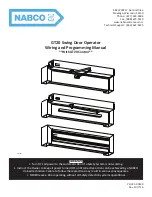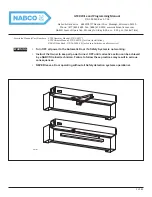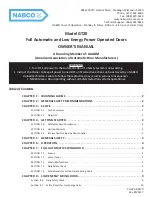
www.parweld.com
www.parweld.com
5
resistant material (leather, heavy cotton, or wool)
and foot protection. Welding on closed containers,
such as tanks, drums, or pipes, can cause them to
blow up. Sparks can fly off from the welding arc. The
flying sparks, hot work piece, and hot equipment can
cause fires and burns. Accidental contact of electrode
to metal objects can cause sparks, explosion,
overheating, or fire. Check and be sure the area is safe
before doing any welding.
WELDING can cause fire or explosion.
Remove all flammables within 10m of the welding
arc. If this is not possible, tightly cover them with
approved covers.
Do not weld where flying sparks can strike flammable
material.
Protect yourself and others from flying sparks and hot
metal.
Be alert that welding sparks and hot materials from
welding can easily go through small cracks and
openings to adjacent areas.
Watch for fire, and keep a fire extinguisher nearby. Be
aware that welding on a ceiling, floor, bulkhead, or
partition can cause fire on the hidden side.
Do not weld on closed containers such as tanks,
drums, or pipes, unless they are properly prepared
according to local regulations
Connect work cable to the work as close to the
welding area as practical to prevent welding current
from travelling along, possibly unknown paths and
causing electric shock, sparks, and fire hazards.
Wear oil-free protective garments such as leather
gloves, heavy shirt, cuffless trousers, high shoes, and
a cap. Remove any combustibles, such as a butane
lighter or matches, from your person before doing any
welding.
FLYING METAL can injure eyes.
Welding, chipping, wire brushing, and grinding cause
sparks and flying metal. As welds cool they can throw
off slag. Wear approved safety glasses with side
shields even under your welding helmet.
BUILDUP OF GAS can injure or kill.
Shut off shielding gas supply when not in use. Always
ventilate confined spaces or use approved air-supplied
respirator.
HOT PARTS can cause severe burns.
Do not touch hot parts with bare hands.
Allow cooling period before working on gun or torch.
To handle hot parts, use proper tools and/or wear
heavy, insulated welding gloves and clothing to
prevent burns.
MAGNETIC FIELDS can affect pacemakers.
Pacemaker wearers keep away.
Wearers should consult their doctor before going near
arc welding, gouging, or spot welding operations.
NOISE can damage hearing.
Noise from some processes or equipment can damage
hearing.
Wear approved ear protection if noise level is high.
Shielding gas cylinders contain gas under high
pressure.
CYLINDERS can explode if damaged.
Protect compressed gas cylinders from excessive
heat, mechanical shocks, physical damage, slag, open
flames, sparks, and arcs. Install cylinders in an upright
position by securing to a stationary support or cylinder
rack to prevent falling or tipping. Keep cylinders away
from any welding or other electrical circuits. Never
drape a welding torch over a gas cylinder. Never allow
a welding electrode to touch any cylinder. Never weld
on a pressurized cylinder - explosion will result. Use
only correct shielding gas cylinders, regulators, hoses,
and fittings designed for the specific application;
maintain them and associated parts in good condition.
Turn face away from valve outlet when opening
cylinder valve.
Use the right equipment, correct procedures,
and sufficient number of persons to lift and move
cylinders.
Read and follow instructions on compressed gas
cylinders, associated equipment, and Compressed Gas
Association (CGA) recommendations.
Sa
Fet
Y

































